The Hokus
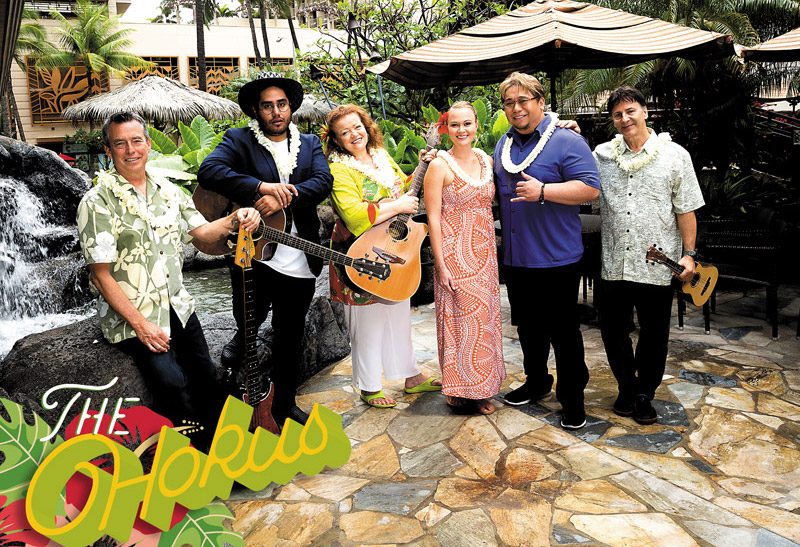
Pictured are (from left) Wade Cambern, IZIK, Robi Kahakalau, Hawaii Academy of Recording Arts board member and officer Kawena Mechler and president Pali Ka‘aihue, and Bryan Kessler at Kani Ka Pila Grille at the Outrigger Reef Waikiki Beach Resort
The 40th annual Na Hoku Hanohano Awards celebrate the best in Hawaii’s music — and also will host big reunions from Hawaiian Style Band and Pure Heart
It was during a long car ride to Los Angeles that songstress Robi Kahakalau dropped something of a bombshell on her unsuspecting companions.
“Robi goes, ‘Hey, I got news for you,'” recalls Hawaii Academy of Recording Arts president Pali Ka‘aihue, who was riding with her and slack-key musician Kawika Kahiapo that day.
“Hawaiian Style Band is getting back together.”
The group, known for its ’90s mega-hits like Love & Honesty and Live A Little, has had an ever-shifting succession of collaborators, but its three founding members — Wade Cambern, Bryan Kessler and Kahakalau — have not performed together since those halcyon days.
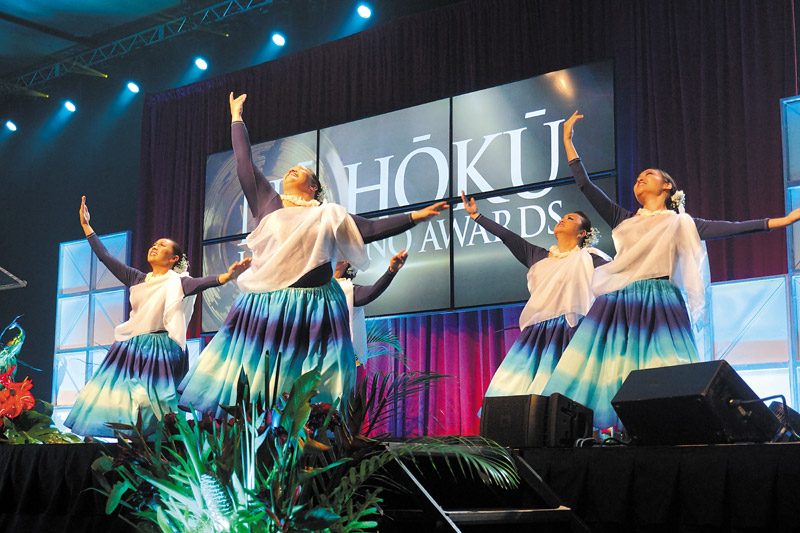
Halau Of New Hope performs at last year’s Na Hoku Hanohano Awards show
PHOTO COURTESY MELE MEI
“Both Kawika and I were completely freaking out,” Ka‘aihue continues, “and immediately I’m thinking, Hokus, perform at the Hokus.”
It was a natural thought. The Na Hoku Hanohano Awards are Hawaii’s Grammys, the ultimate musical honor for Hawaii-born and -based performers, composers and producers.
This year, the awards celebrate 40 years as a champion of local music, a place where the “stars of distinction,” old and new, shine on.
THE PAST
It was the late Victor Opiopio, better known to the masses as KCCN’s Krash Kealoha, who came up with the idea of a Hawaii-exclusive music awards.
“He thought they should be a celebration and an awards ceremony to really reflect … Hawaii’s great artists and compositions and songs,” Ka‘aihue says.
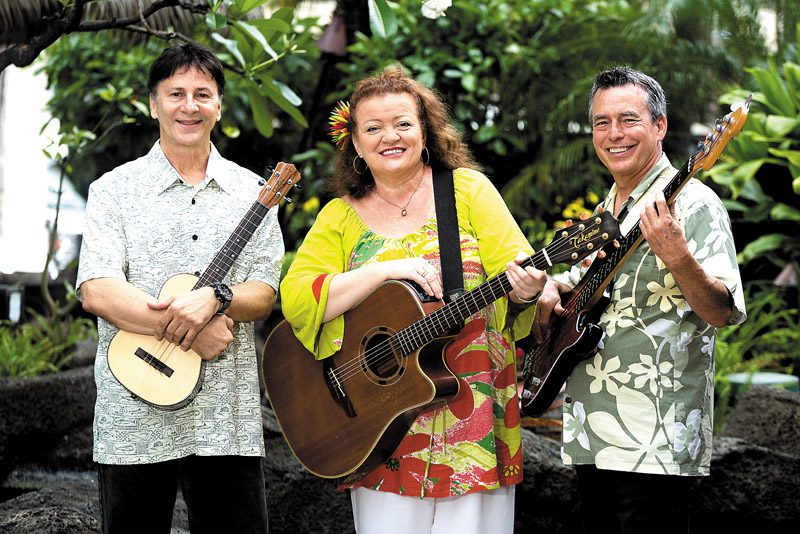
Hawaiian Style Band: Bryan Kessler, Robi Kahakalau and Wade Cambern
With the help of his boss, Sydney Grayson, and fellow DJs Kimo Kahoano and Jacqueline “Skylark” Rossetti, Kealoha presented the first-ever Na Hoku Hanohano Awards in 1978.
In the beginning, winners were chosen by the public. Industry professionals formed HARA in 1982, and the group took over judging the rapidly growing show.
“You get to become a HARA voting member by having a recording credit on any kind of music project or DVD, CD singles, EPs — any of that counts,” Ka‘aihue explains. “That allows you to vote on the awards.”
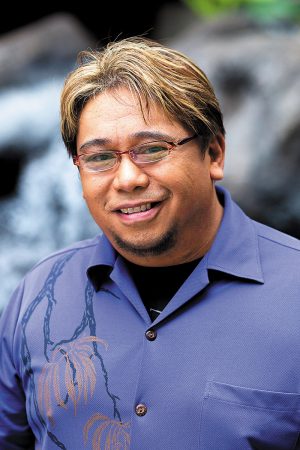
HARA president Pali Ka‘aihue
An initial screening committee ensures each entry is a valid release in the appropriate category before lists are forwarded to HARA members, who select the final nominees and winners from that pool.
“HARA is full of different creators, different artists, people who are in the industry. They’re your peers, basically. So, to receive a Na Hoku Hanohano Award, for me, it’s a little bit of validation,” muses IZIK, a first-time nominee this year in the contemporary album and most promising artist categories.
“It’s also just nice to know that other musicians know who you are,” he adds with a laugh.
THE PRESENT
This year’s Na Hoku Hanohano Awards is all about celebrating the old, the new and the old-made-new-again.
“We have some incredible first-time artists who are releasing, we have some incredible former Na Hoku-winning artists who are submitting new work, and then we have iconic artists who we wanted to bring in and be a part of the celebration,” Ka‘aihue explains.
One of two big reunions that night involves, of course, Hawaiian Style Band (see sidebar).
The other trio of titans is Pure Heart.
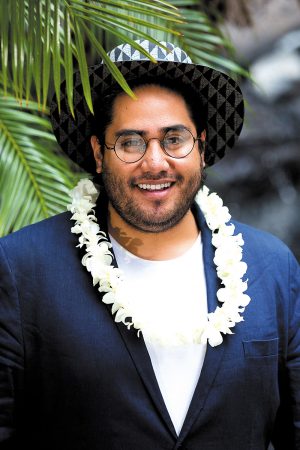
IZIK
Jake Shimabukuro, Jon Yamasato and Lopaka Colon will perform together for the first time in years, alongside John Cruz, in a special memorial to Ernie and Guy Cruz.
“Rather than just do something where it was having some of (Ka‘au Crater Boys and Ernie’s) songs performed, we thought that it would be such a great way to pay tribute and have a reunion,” Ka‘aihue says.
Other confirmed performers this year include Keauhou, Raiatea Helm, Amy Hanaiali‘i Gilliom, Kawika Kahiapo, Hoku Zuttermeister, Kunia Galdeira, Cyril Pahinui Band, Na Leo Pilimehana, Kalani Pe‘a, Jeff Peterson, IZIK, Yoza and more.
THE FUTURE
Na Hoku Hanohano Award winners don’t get money (though they do get a nice trophy). But they receive something even more valuable.
“The phone was ringing more after (our first win in 1991),” remembers Kessler. “The music got played a lot more on the radio around that time, leading up to it, afterward — pretty much every radio station in Hawaii was playing something from our albums.
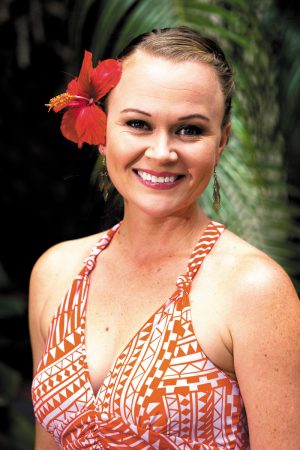
HARA board member and officer Kawena Mechler
“That’s a real thrill, when you put your heart into something and you’re driving with your friend in the car, and all of a sudden here’s your song on the radio.”
Publicity still is part of the package, but Ka‘aihue reflects that the industry has changed a lot in 40 years. Brick-and-mortar stores are mostly gone, and even radio has diminished as a dominant source of music consumption. People are getting their music from new places.
“Now it’s more digital, MP3s and iTunes and Amazon Music and stuff,” he muses.
That makes the exposure the Hokus can provide even more important.
There’s a lot of emphasis today, he says, on getting people out to live performances. Nowadays, in fact, the awards serve as an anchor to a larger, more expansive campaign of Hawaiian music: Mele Mei, which facilitates a three-month storm of live Hawaiian music that spans the island chain, the Mainland and even Japan.
“I think the genres of Hawaii artists have also increased,” Ka‘aihue says, “and (the Na Hoku Hanohano Awards) are very reflective of what young artists are inspired by nowadays. We have so many more categories than when we originally started.”
In the last 10 years, he adds, the show has added categories like ukulele, alternative music and slack key.
Ka‘aihue foresees future Na Hoku Hanohano Awards continuing to acknowledge and incorporate this increasing diversity.
“The fact that the awards can be reflective of the industry and the artists and what’s going on and still be able to celebrate at this grand scale, and still be able to celebrate new artists and iconic artists — it’s a great thing, a special thing. It says a lot about Hawaii and the community and our support of each other.
“Probably the Hokus will have to be a week long,” he jokes.
The 40th annual Na Hoku Hanohano Awards will take place at 5:15 p.m. May 20 at Hawaii Convention Center. Tickets cost $175 general admission, $150 kamaaina and $135 for HARA members. For more information, as well as a full list of nominees, visit nahokuhanohano.org.
Hawaiian Style Band
So, what got the band back together?
“It’s about time,” Robi Kahakalau says. “We’re celebrating our 25th anniversary.
“With the passing of Ernie Cruz Jr., we thought life is too short to let it go by. And we just thought it’d be nice to get together and make things happen again.”
“Enough time went by where we all felt it was time to revisit the music and the band and the friendship, and it’s been fun,” adds Bryan Kessler. “The keys are a bit lower, but the music’s still there.”
So after the Hokus are done, what’s next? The band promises this isn’t just a one-time gig — they’re back, for real.
“We’re available for work,” jokes Wade Cambern, adding that a new recordings may well be in the future, somewhere, sometime.






